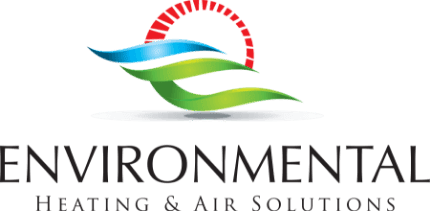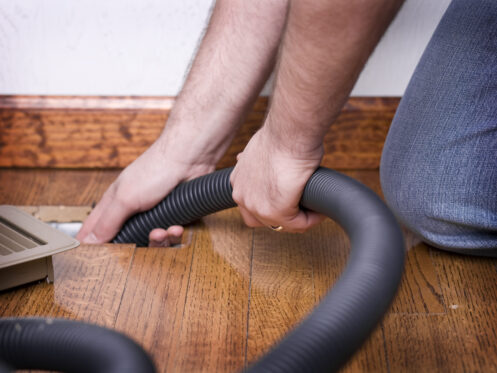As most homeowners in Roseville, CA already know, you can improve your home’s energy efficiency by upgrading your home’s insulation, windows, and HVAC equipment. However, you may not realize that your home’s ductwork could have an outsized impact on its energy efficiency, too. Here’s a look at some of the ways that your ducts can impact your home’s HVAC energy efficiency.
Ductwork Sizing
In most Roseville homes, you’ll find ductwork that dates back to the original construction of the home. As long as the ductwork remains in good condition, that isn’t a problem in and of itself. However, your home’s ductwork may not be the right size for the air conditioner your home needs. That can lead to persistent HVAC problems, including energy waste.
When your HVAC system is properly sized, ductwork that’s too small can lead to excess static pressure that robs your HVAC system of its efficiency. This happens because your HVAC blower will have to work against that excess pressure to keep delivering conditioned air throughout your home. That leads to wasted electricity and unnecessary wear and tear. Ductwork that’s too large, on the other hand, allows more time for conditioned air to come to room temperature before reaching its destination. That will cause your HVAC system to run for much longer than necessary because it will struggle to raise or lower your home’s temperature.
Undersized return air ductwork can also starve your HVAC of the airflow it needs to work properly. In that situation, your HVAC blower will face additional resistance as it tries to draw air in, and your system won’t be capable of maintaining your home’s temperature where you want it.
Ductwork Design
Just as the size of your home’s ductwork can affect your HVAC efficiency, so too can the layout of your ductwork. If your home’s ductwork has any unnecessary twists and turns or features branches that travel too far from the HVAC unit, it will lead to HVAC efficiency problems. Twists and turns increase resistance against the airflow coming from your HVAC. They may also reduce the volume of air that reaches certain parts of your home, creating hot and cold spots. Excessively long branches can also lead to certain rooms not getting enough conditioned air, forcing your system to run for longer to give you the comfort you want.
Leaky Ductwork
Another ductwork issue that can rob your HVAC of efficiency is leaky ductwork. According to the Department of Energy, the average ducted HVAC system wastes up to 30% of the energy it consumes because of ductwork losses. Air leaks typically make up the bulk of those losses. Ductwork can develop air leaks as a natural consequence of aging, as its joints deteriorate and duct tape comes loose. It can also happen when your ductwork operates with high static pressure, which exposes them to additional wear and tear. Ductwork can also develop cracks due to aging that also allow air to escape into your home’s walls. Since ductwork is metal, it can also corrode over time, especially if it is exposed to a humid environment.
Inadequate Ductwork Insulation
Your ductwork might also suffer energy losses through the process of conductive loss. This refers to when your ductwork allows hot air to lose heat energy or cold air to absorb it. While it’s normal for ductwork to allow some energy losses in this way, efficient ductwork should minimize them. The best way to minimize conductive losses is by ensuring that your home’s ductwork has proper insulation.
Any ductwork running through unconditioned spaces like attics and basements should have insulation with an R-value of at least 6. And that’s just the minimum. For maximum energy savings, it’s a good idea to upgrade your ductwork’s insulation to an R-value of 12, if possible. Like duct tape, insulation may sag over time, so it is something that should be periodically inspected.
Obstructed Vents
Ductwork requires vents that are free to dispel air for them to work at peak efficiency. If you have furniture blocking your vents, this may cause a backup in pressure. Your HVAC system will also be less efficient because it must work much longer before your ducts can deliver warm or cool air to bring a room to its desired temperature.
Dirty Ductwork
Over time, the HVAC ductwork in your home will accumulate dust and dirt from the air passing through it. Although that may not seem like a big deal, it can affect your HVAC efficiency more than you think. It does this by increasing friction inside your ducts. This slows down airflow and forces your HVAC blower to work harder than it should need to.
Plus, the accumulated dust and dirt can lead to a clogged HVAC air filter when it comes loose and enters your HVAC system. According to the US Department of Energy, a clogged air filter can cut your HVAC’s efficiency by as much as 15%. It will also force you to replace your HVAC filter more often than you should need to. On average, an HVAC air filter should last for about three months. If yours gets dirty enough to require replacement more often than that, excessively dirty ductwork could be the cause.
For all of those reasons, experts recommend that homeowners schedule thorough ductwork cleaning at least once every three years. However, if your home is excessively dusty, you may need your ductwork cleaned even more often than that. Since Roseville is an area that’s prone to wildfires, exposure to smoke alone may be enough reason to need more frequent duct cleanings. And if you doubt how dirty your ductwork can get, shine a flashlight into your home’s return air duct. If you haven’t had your ducts cleaned recently, you probably won’t like what you see.
Your Local Ductwork Efficiency Experts
Since 2010, Environmental Heating & Air Solutions has been the go-to provider of ductwork services here in Roseville. We offer comprehensive ductwork solutions, including inspections, duct cleaning, and repairs. They’re all a part of our complete indoor air quality services. We also offer expert HVAC installation, repair, and maintenance services, along with residential plumbing services. Additionally, we sell and install attic fans and whole-house fans that can be invaluable tools in your quest to cut your energy costs.
We offer home energy score testing services to help you identify the best ways to improve your home’s energy efficiency. We’re your one-stop shop for all of your home’s infrastructure needs. Plus, all of our HVAC technicians are NATE certified, and our plumbers have the latest training and years of experience. As a Better Business Bureau-accredited business with an A+ rating, you’ll never have to worry whether your home is in good hands when working with us. We even offer financing on approved credit to help you afford the HVAC products your home needs.
So, if you think your Roseville home’s ductwork is harming its energy efficiency, call our experts at Environmental Heating & Air Solutions right away.

